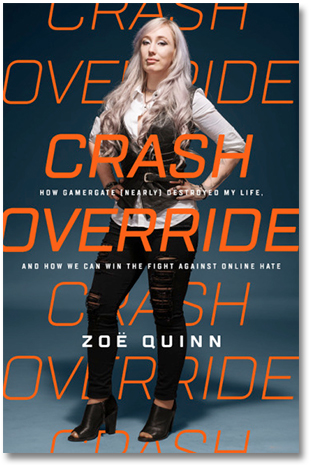Crash Override, book review: Gamergate and the battle against online hate


Crash Override: How Gamergate (Nearly) Destroyed My Life, and How We Can Win the Fight Against Online Hate • By Zoë Quinn • PublicAffairs • 256 pages • ISBN: 978-1-61039-808-4 • $27 (hardcover) / $14.99 (ebook)
The targets of today's large and comprehensive global campaigns to destroy their professional standing and personal lives become the nexus of internet Hurricane Irmas that continue to drench and buffet them years later.
The ultimate purpose of the death threats, doxing, rape threats, and stalking of friends, professional contacts, and family, writes Zoë Quinn in Crash Override, is to silence. For this reason, she argues that the routinely given advice "Don't feed the trolls" is completely wrong. That worked when all they wanted was to disrupt and shock. Today, however, it means you must effectively disappear from your own life. If, as Quinn says she does, you suffer from depression, then the abusers' messages match those coming from your own "Trashbrain".
Zoë Quinn is the unfortunate 20-something game developer who, after ending a relationship she says was abusive, found herself the target of a manifesto that her ex published to punish her. Around that publication, the angry mob known as 'Gamergate' rapidly assembled and arrayed itself against Quinn.
Having grown up an isolated misfit in a tiny town in the New York state Adirondack mountains, Quinn had found her first solace in computer gaming -- a community that became the first to which she felt she belonged on the internet. But the internet's ability to connect people was now turned against her, and platform owners offered little or no help. As Quinn explains, tech companies have little motivation to do so, because popularity brings more attention, which in turn brings advertising revenue. The technology itself is content-neutral, which means that 'Like' buttons and trending algorithms do not care what -- or who -- the content is about.
The first part of Crash Override retells Quinn's experience of Gamergate: hiding out for months on friends' sofas because she was afraid to go home; unable to continue work on the games she'd been excited about developing; fearful of going to public events where her presence had been publicized in case someone decided to carry out the death and rape threats she kept receiving; and subject to a court system in which a judge told her to go offline and find a new career.
Fighting back
Much of the rest of the book is an account of her activist effort to create Crash Override Network, a group of volunteers seeking to do more effectively for others what Quinn struggled to do for herself. This section includes a chapter of practical advice. The group cultivated contacts with platforms to enable speedy escalation of complaints, and developed expertise at collecting and saving evidence. None of this whack-a-mole activity, however, was really enough, particularly because platforms do not help the process by collaborating: the tech world's companies are "siloed" -- which is ironic for an industry dedicated to connecting people.
While she writes about her interactions with police and courts, Quinn doesn't appear to have sought advice from those experienced in dealing with cases of domestic violence.
Many of those who would like to limit hate speech and abuse on the internet -- that is, many governments around the world -- propose to do so via censorship that will cause extensive collateral damage. Quinn, who regards the internet as her first home, is rare in wishing to protect the best parts -- including the haven it provides for marginalized people to speak openly and anonymously. "Suffer us witches to live," she concludes.
Read more book and film reviews
- The Political Spectrum, book review: How wireless deregulation gave us the iPhone
Thomas Winslow Hazlett offers an accessible history of wireless technology, describing how regulators often stifled innovative competition under pressure from incumbent interests, and how deregulation eventually gave us FM radio, HBO, wi-fi, and the iPhone. - Risk, film review: Access all Assange areas, to incoherent effect
Over six years of filming, Laura Poitras follows the elusive and distant Wikileaks founder from a friend's Norfolk estate to his Ecuadorian Embassy bolt-hole. - Move Fast and Break Things, book review: Where did the internet go wrong?
Jonathan Taplin's book examines how a handful of Silicon Valley libertarians came to dominate the internet via giant companies like Google, Facebook and Amazon. - To Be a Machine, book review: Disrupting life itself
Mark O'Connell explores the drive to transcend biology using technology, examining ideas like the Singularity, mind uploading, cryonics, whole-brain emulation and cyborgs.